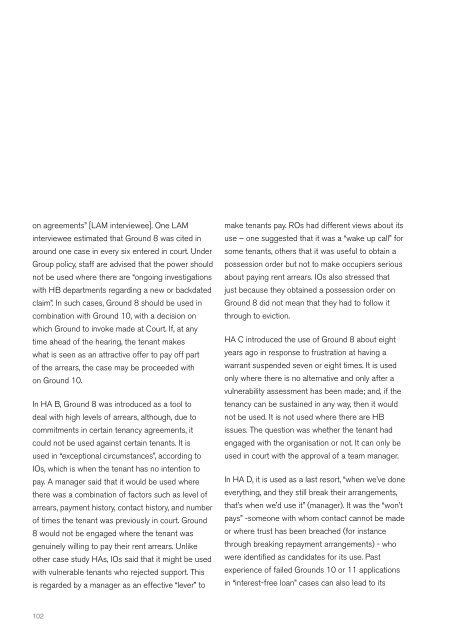Rent arrears management practices in the housing association sector
Rent arrears management practices in the housing association sector
Rent arrears management practices in the housing association sector
Create successful ePaper yourself
Turn your PDF publications into a flip-book with our unique Google optimized e-Paper software.
on agreements” [LAM <strong>in</strong>terviewee] . One LAM<br />
<strong>in</strong>terviewee estimated that Ground 8 was cited <strong>in</strong><br />
around one case <strong>in</strong> every six entered <strong>in</strong> court . Under<br />
Group policy, staff are advised that <strong>the</strong> power should<br />
not be used where <strong>the</strong>re are “ongo<strong>in</strong>g <strong>in</strong>vestigations<br />
with HB departments regard<strong>in</strong>g a new or backdated<br />
claim” . In such cases, Ground 8 should be used <strong>in</strong><br />
comb<strong>in</strong>ation with Ground 10, with a decision on<br />
which Ground to <strong>in</strong>voke made at Court . If, at any<br />
time ahead of <strong>the</strong> hear<strong>in</strong>g, <strong>the</strong> tenant makes<br />
what is seen as an attractive offer to pay off part<br />
of <strong>the</strong> <strong>arrears</strong>, <strong>the</strong> case may be proceeded with<br />
on Grounḍ10 .<br />
In HA B, Ground 8 was <strong>in</strong>troduced as a tool to<br />
deal with high levels of <strong>arrears</strong>, although, due to<br />
commitments <strong>in</strong> certa<strong>in</strong> tenancy agreements, it<br />
could not be used aga<strong>in</strong>st certa<strong>in</strong> tenants . It is<br />
used <strong>in</strong> “exceptional circumstances”, accord<strong>in</strong>g to<br />
IOs, which is when <strong>the</strong> tenant has no <strong>in</strong>tention to<br />
pay . A manager said that it would be used where<br />
<strong>the</strong>re was a comb<strong>in</strong>ation of factors such as level of<br />
<strong>arrears</strong>, payment history, contact history, and number<br />
of times <strong>the</strong> tenant was previously <strong>in</strong> court . Ground<br />
8 would not be engaged where <strong>the</strong> tenant was<br />
genu<strong>in</strong>ely will<strong>in</strong>g to pay <strong>the</strong>ir rent <strong>arrears</strong> . Unlike<br />
o<strong>the</strong>r case study HAs, IOs said that it might be used<br />
with vulnerable tenants who rejected support . This<br />
is regarded by a manager as an effective “lever” to<br />
102<br />
make tenants pay . ROs had different views about its<br />
use – one suggested that it was a “wake up call” for<br />
some tenants, o<strong>the</strong>rs that it was useful to obta<strong>in</strong> a<br />
possession order but not to make occupiers serious<br />
about pay<strong>in</strong>g rent <strong>arrears</strong> . IOs also stressed that<br />
just because <strong>the</strong>y obta<strong>in</strong>ed a possession order on<br />
Ground 8 did not mean that <strong>the</strong>y had to follow it<br />
through to eviction .<br />
HA C <strong>in</strong>troduced <strong>the</strong> use of Ground 8 about eight<br />
years ago <strong>in</strong> response to frustration at hav<strong>in</strong>g a<br />
warrant suspended seven or eight times . It is used<br />
only where <strong>the</strong>re is no alternative and only after a<br />
vulnerability assessment has been made; and, if <strong>the</strong><br />
tenancy can be susta<strong>in</strong>ed <strong>in</strong> any way, <strong>the</strong>n it would<br />
not be used . It is not used where <strong>the</strong>re are HB<br />
issues . The question was whe<strong>the</strong>r <strong>the</strong> tenant had<br />
engaged with <strong>the</strong> organisation or not . It can only be<br />
used <strong>in</strong> court with <strong>the</strong> approval of a team manager .<br />
In HA D, it is used as a last resort, “when we’ve done<br />
everyth<strong>in</strong>g, and <strong>the</strong>y still break <strong>the</strong>ir arrangements,<br />
that’s when we’d use it” (manager) . It was <strong>the</strong> “won’t<br />
pays” -someone with whom contact cannot be made<br />
or where trust has been breached (for <strong>in</strong>stance<br />
through break<strong>in</strong>g repayment arrangements) - who<br />
were identified as candidates for its use . Past<br />
experience of failed Grounds 10 or 11 applications<br />
<strong>in</strong> “<strong>in</strong>terest-free loan” cases can also lead to its




